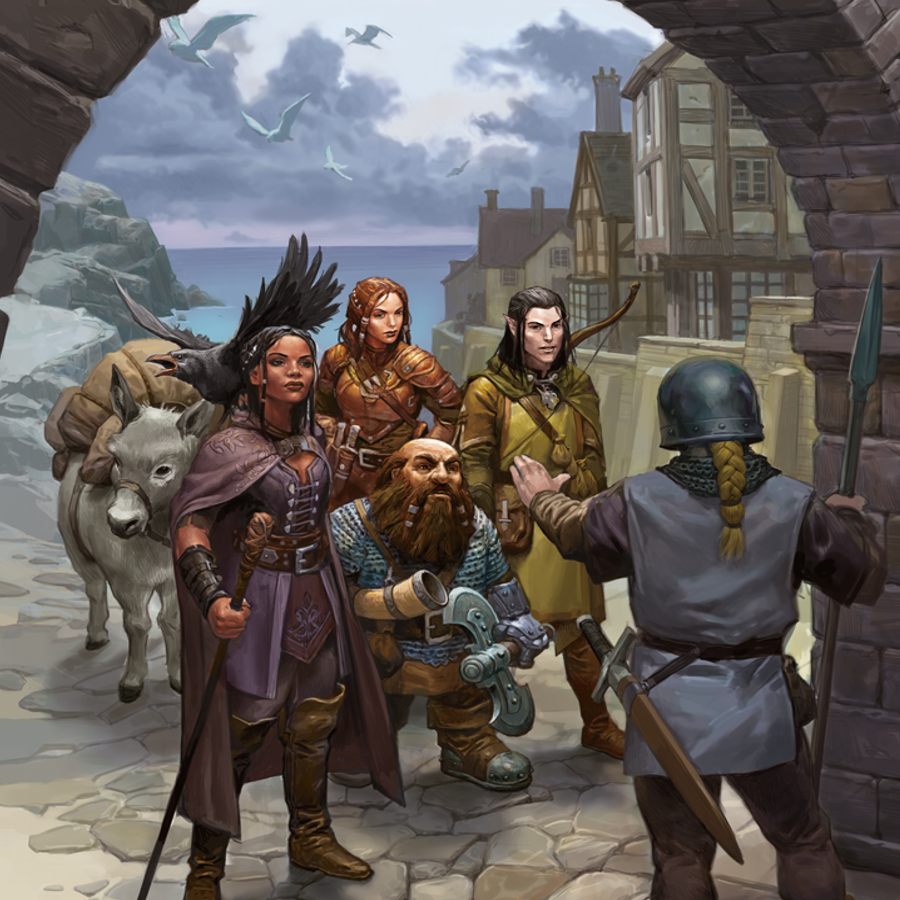10 Roleplaying Mistakes You're Probably Making

Written by Luke Hart
Today, we’ll go over the top 10 roleplaying mistakes you’re probably making. I’ll also share some tips on improving social interaction in your game.
Watch or listen to this article by clicking the video below.
#1 Calling It Roleplaying!
If you clicked on this article thinking that “roleplaying” only refers to the talky-talky bits in the game, you know, where the characters are talking with NPCs or among themselves—especially talking “in character” with special voices or accents—well, then the following rant is for you.
If you refer to the “talky-talky” bits of the game and talking in character as “roleplaying,” well, guess what—it’s not. Admittedly, that is a tiny part of roleplaying, but the entire game is role-playing—the combat, exploration, social interactions, opening doors, looking for traps or finding secret doors, fighting with and talking to enemies, and talking to shopkeepers—all of that is roleplaying.
The talky-talky part is what we usually refer to as social interaction, so please stop calling it roleplaying.
However, the good news is that this article is actually about the talky-talky stuff and how to improve social interactions in your role-playing games.
#2 Planning out Dialogue Word for Word
This is a mistake I’ve seen GMs do. They have read-aloud text for dialogue. In fact, I have seen modules with massive sections of read-aloud text for NPC dialogue. It’s like you’re supposed to read that to your players as the NPC is talking—don’t do that. It sounds forced and unnatural. Read-aloud text is best used for descriptions, not for real conversations.
Instead, you want to know the NPC’s motivations, desires, and fears.
Motivations and Desires
Knowing what motivates an NPC—what they want—helps you decide what they will say and do. Let the NPC’s motivation drive the social interaction scene, and improvise dialogue based on the NPC’s motives and goals. You don’t need a script or read-aloud text for the NPC’s dialogue to know what they’ll say. Instead, allow their motivations and goals to inform what they do and say. Also, look at their fears.
Fears
Know what an NPC is afraid of, as this also determines what they will say and do.
The NPCs also have goals. For instance, a guard wants to get through the day alive and go home to their wife and kids. A blacksmith may be afraid of adventuring parties using violence to get what they want or was nearly killed a couple years ago over horseshoes. An evil villain may be seeking justice against the village that executed his father and exiled him and his mother when he was small—and get rid of characters trying to stop him.
Also, know how well-educated the character is because that will influence how they talk, their word choices, and how they react to others of different educational levels. Do they respond poorly if they feel talked down to? Or do they admire people who are better educated?
If you know these things, improvising dialogue is a lot easier.
#3 Not Acting as the NPC
While roleplaying an NPC, you need to act as the NPC. Describe how an NPC says something, not just what they say. Even better, don’t just describe it—do it!
The second thing you want to know about every NPC is their mannerisms.
Mannerisms are how they act, their visual ticks—body language like posture, facial expressions, and hand movements—things like wringing their hands, adjusting rings on fingers, an eye that twitches, and so on, and then portray those things during the game, during the conversation.
Your NPCs will be much better if you act out their mannerisms while allowing their motivations to organically drive the conversation. The social interaction scenes will be far smoother, more natural, and more enjoyable for everyone—the GM and players.
Also, consider referencing places that the NPC has been or things from their past, such as “When I was an apprentice in Alehelm’s smithy . . .” or, “I stopped adventuring when a necromancer killed the rest of my party and . . . I ran away, terrified.”
Here’s a GM shortcut for you. Picture a character from pop culture or a performer you know well and imitate their attitudes, way of speaking, and gestures.
A note on the ridiculous: For whatever reason, players often have their characters say or do ridiculous things in social interaction scenes. Don’t let this throw you off. You’re still just roleplaying the NPC. Consider how the NPC would react and then just do it. Remember, there is nothing wrong with saying no to the ridiculous if that is the tone of your game.
#4 Not Using Unique Voices for NPCs
I am not talking about being the world’s best voice actor. I’m not that great myself, but I still do my best. I know this can be uncomfortable for other GMs, too; however, using a different voice when you speak in character as an NPC is yet another way to elevate social interactions.
TIP: Don’t worry about replicating real-world accents. Just change the tone of your voice, the verbiage you use, or the slang you use.
For example, when I talk as the wizard, I just add a haughty sound to my voice, tip my head a little, and try to use big words that show off my education. I’m just changing the way I talk and my mannerisms slightly. I’m not doing anything fancy or special for the wizard. The barbarian talks in a higher tone, gets a little goofy, and has weird facial expressions. I’m not trying to copy any real-world accents or anything.
#5 Not Practicing Before the Game Begins
When preparing for a game, I often play out conversations beforehand, playing the side of the characters and the NPC.
I’m not only practicing the NPC’s mannerisms (voice and body ticks) but also what they might say based on their motivations and goals. I imagine what the players might say, then role play these out myself.
This practice conversation rarely happens during the game, but it helps me get in character and understand the NPC better. This prepares me to do the real thing at the game table.
#6 Not Preparing NPCs in Advance
When possible, and especially for important NPCs, prepare them in advance. Have a card with a few notes about the character, such as what they want, what they fear, what motivates them, what won’t work on them, their general personality, and how the game master should stand, sit, talk, or act while roleplaying the character.
You can also note a phrase that the NPC often uses, such as, “Well, since you asked . . .” “Come to think of it . . .” or “Or so they say . . .” Catchphrases are a great way to get into a character’s head.
When players interact with an NPC you didn’t prepare in advance, often because they went somewhere or decided to talk to someone unexpectedly, there are two alternatives to improvisation: create a warehouse of NPCs in advance that you can pull out and use, or buy premade ones. There are NPC cards available on Amazon that I’ve found helpful at times—even if I usually forget to use them—and certain issues of Lair Magazine have premade NPCs in them that you can drag and drop into your games.
#7 Having All NPCs Be Suspicious or Hostile to the Characters
I don’t know why this is a thing, but it’s a recurring theme I see in games, and it makes no sense. It’s unrealistic unless the characters are infamous and known for doing horrible things to folks.
If all of your NPCs are hostile or appear like they don’t want to be bothered, it will get old for your players fast. Instead, change up your NPCs’ starting attitudes and personalities. Also, remember that most NPCs in service industries at least want to appear welcoming and friendly. After all, they’re trying to get customers to buy stuff.
If your NPCs take everything personally and get more hostile or aggressive no matter what the characters say, that doesn’t create an atmosphere where players want to interact with NPCs. Changing things up keeps NPCs interesting and engaging.
#8 Forgetting to Breathe
Sometimes, you might freeze up or panic when playing an NPC. This might happen, for instance, when you’re roleplaying a clever, quick-witted NPC when you’re not as mentally agile.
Breathe. Take your time. The game master controls the pace of the game. You control the flow of time, so feel free to pause before answering and say things like, “The innkeeper immediately replies,” to make a response that took a moment to think of seem more immediate.
You can always take a “bathroom break” to give yourself time to think.
#9 Not Finding Inspiration Elsewhere
If you want to create an awesome NPC, look at other mediums where you can find inspiration, such as books, movies, comics, and so on. For instance, if you want to build a clever, quick-witted NPC, you can research famous people like Groucho Marx, Jimmy Carr, Winston Churchill, Bill Hicks, and other historical people and comedians known for their wit.
YouTube is a great resource for this. Just search “comedian” and “heckler.” Remember that there is a difference between wit and trolling. Famous, witty people are a good resource for wit; Twitter and YouTube comment sections rarely are. Name-calling is the worst form of wit; turning someone’s words against them is wit. As for turning someone’s words against them, you can often just let the player’s words be their own comeback. Focus on facial expressions like raised eyebrows, eye rolls, and yawning.
# 10 Not Establishing Limits
Consider what is and isn’t possible when characters interact with NPCs. Players will often try to influence NPCs; merchants and monsters are the most common targets. However, there are some things that NPCs just won’t do no matter what, no matter how high the players roll on their dice.
For instance, the characters will never get a shop owner to give them something of great value for free. A loyal house guard for a powerful noble who has been on their lord’s staff for decades isn’t going to rush out of the house to help someone in need unless that person is somehow related to their lord’s family. A barmaid raised in a society under constant threat of war with orcs isn’t going to be seduced by even a high-Charisma, half-orc character, no matter how high they roll.
Remember that if players are role playing their interactions, their attitudes and words matter. Just like with real-world social interactions, if the characters are hostile or aggressive with their words, persuasion-based skills aren’t likely to be very persuasive. They may have to use intimidation or something similar.
Also, remember that different people react to intimidation in different ways. Successful attempts to intimidate could help the players get information or get NPCs to do something they might not otherwise do, but it’s not mind control. Intimidation can be met with answers, but it can also cause an NPC to give false information just to save themselves from whatever threat is being levied against them, or it might cause a particularly hostile NPC to fight back and shift a scene from social interaction to combat.
Experience Fey Creatures and Their Tricksy Plots!
If you’re looking to start a new 5e campaign or reboot your current one, Into the Fey may be exactly what you need. Designed for levels 1 to 5, Into the Fey contains everything you need to start playing:
- 11 fey-themed adventures
- over 40 new fey creatures
- the fully fleshed-out starting town of Aeredale
- regional information and maps for both the material and fey planes
Pick up the Into the Fey Ultimate Bundle to get the hardcover, the PDF, digital maps, and digital tokens.
Starting a new campaign can be tons of work; let Into the Fey do some of the heavy lifting for you!
-
Posted in
Game Master How-To Articles







